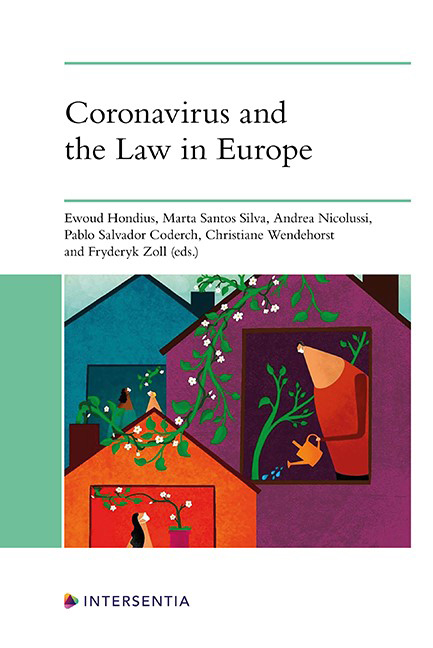Book contents
- Frontmatter
- Preface
- Contents
- List of Keywords
- List of Contributors
- PART I COVID-19 AND FUNDAMENTAL RIGHTS
- PART II STATES AGAINST THE PANDEMIC
- PART III COMPENSATION FOR COVID-19 RELATED DAMAGE
- PART IV CONTRACT LAW
- PART V CONSUMER LAW
- PART VI LABOUR AND SOCIAL LAW
- PART VII CORONAVIRUS CHANGING EUROPE
- Epilogue
- Annex: ELI Principles for the COVID-19 Crisis
- About the Editors
Coronavirus and the Law in Romania
Published online by Cambridge University Press: 10 December 2021
- Frontmatter
- Preface
- Contents
- List of Keywords
- List of Contributors
- PART I COVID-19 AND FUNDAMENTAL RIGHTS
- PART II STATES AGAINST THE PANDEMIC
- PART III COMPENSATION FOR COVID-19 RELATED DAMAGE
- PART IV CONTRACT LAW
- PART V CONSUMER LAW
- PART VI LABOUR AND SOCIAL LAW
- PART VII CORONAVIRUS CHANGING EUROPE
- Epilogue
- Annex: ELI Principles for the COVID-19 Crisis
- About the Editors
Summary
Romanian authorities reacted to the COVID-19 pandemic with various legal instruments, applying in numerous fields of law. Some measures were implemented in order to control the spread of the disease and to ensure the maximum capacity of the healthcare service providers to deal with the situation. Other measures addressed (and tried to mitigate) the economic consequences of the pandemic and of the measures from the first category. Both types of measures involved certain serious limitations on the exercise of certain fundamental rights, which would not have been compliant with the constitutional provisions governing Romania in normal times. Because of this, the state of emergency was declared (and was in force for 60 days) in order to allow authorities to adopt the proposed measures. These measures applied in various fields, among them: health care, public order, public administration, labour and social security, performance of agreements, dispute resolution, education.
INTRODUCTION: THE CONSTITUTIONAL AND LEGAL FRAMEWORK OF REGULATION DURING EXCEPTIONAL SITUATIONS IN ROMANIA
The emergence of COVID-19, following the example of many other countries, was swiftly qualified in Romania as an “exceptional situation”, one that required exceptional legislative and regulative measures. Such measures usually entail restrictions on rights. However, human rights are protected by the Romanian Constitution. Therefore, the adoption of such legislative and regulative measures must observe the constitutional mechanism put in place for these exceptional circumstances.
The Romanian Constitution provides for the protection of an extensive catalogue of human rights in Articles 28–51, backed by an acknowledgement of the primacy of international instruments protecting human rights (including the European Convention of Human Rights) over the domestic provisions. According to Article 53 of the Romanian Constitution, the exercise of rights and freedoms may be restricted only by law (therefore not through administrative acts or decisions) and only for certain purposes, such as protection of national security, public order, health or morality, protection of other rights and freedoms, etc. Moreover, according to the same constitutional provision, the restrictions must be proportional to the “situation that generated it”, must be “necessary in a democratic society”, must not be discriminatory and must not annihilate the essence of the right or freedom whose exercise is restricted.
The Constitution also provides for the “exceptional circumstances” in which both rights limitations and derogations from the regular decision-making processes may be applied.
- Type
- Chapter
- Information
- Coronavirus and the Law in Europe , pp. 183 - 200Publisher: IntersentiaPrint publication year: 2021



